'No stock': Kmart shelves still 'empty' despite re-stock promise
Kmart fans were left up in arms earlier this week when the retailer shared a post on Facebook about its new ‘augmented reality’ experience.
The ‘Kmart AR and Kbot Experience’ allows shoppers to try out the store’s latest collection in their own home — but Facebook users were quick to point out an obvious problem with the app.
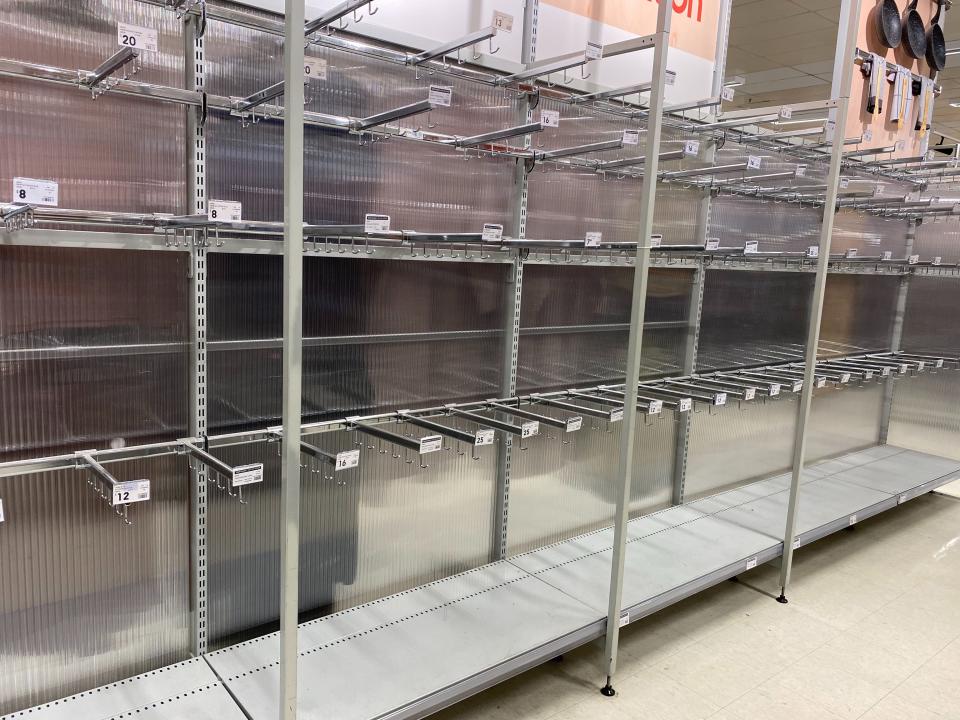
Testing out how products from the new August Living range might look via the magic of technology is all well and good but, with the ongoing lack of stock in-store and online, it’s near impossible to turn those decor dreams into reality.
“Augmented reality because you can’t have it in real life because whoever orders your stock doesn’t order enough,” wrote one shopper in the comments.
No stock ‘until November’
Hundreds more shared their frustration over the empty shelves — which Kmart had previously promised to fill by July. That has since been quietly updated to August on the website’s ‘COVID-19 Info’ page.
“Nothing in stock... Why release a catalogue with no stock to back it up!” one wrote.
“Our shops are empty Kmart and the lamp I want is not available online. What’s happening?” another said.
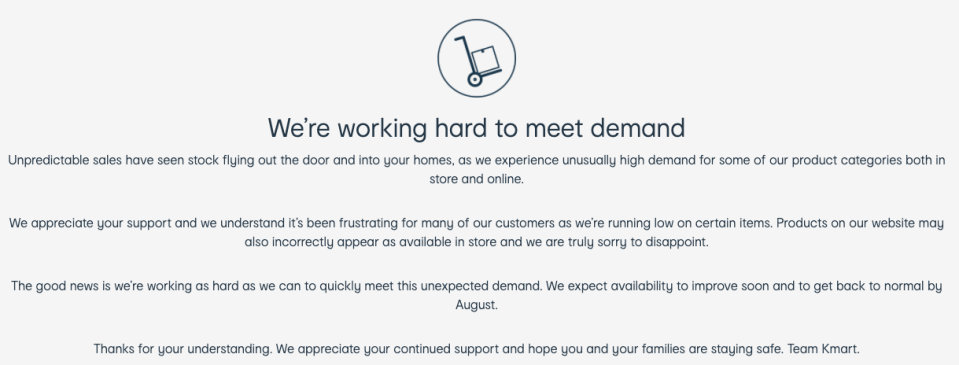
One Facebook user reported that shoppers at their local store might have to wait up to three months for a re-stock:
“My local store is saying they won’t have stock until November, I phoned to enquire today,” they revealed.
A Kmart representative responded to another user who asked why the store ‘always runs out of stock,’ claiming that more would be ‘available soon’:
“We understand it's frustrating when you can't find the items you love, but please be assured that we're getting regular deliveries in, so more stock will be available soon,” they wrote.
RELATED:
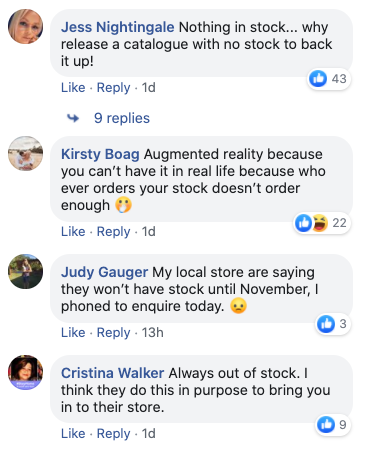
Retail expert Professor Gary Mortimer from the Queensland University of Technology told news.com.au that Kmart’s choice to stock more ‘private label’ products, as opposed to big-name brands that have their own supply chains, might be their Achilles heel.
“An expanded private label product strategy is smart as it delivers retailers higher margins and protects against competition.
“However, there is risk in failing to manage the composition of range and supplier base. If you increase the range of private label products you sell and your suppliers can’t supply, you end up with empty shelves,” Prof Mortimer told the publication.
Kmart website a ‘waste of time’
Other commenters took issue with Kmart’s online shopping experience, recounting their failed attempts to purchase products which turned out to be unavailable only after they were added to cart.
“I can’t ever get a thing I want; it’s available online, add to cart, get to the checkout and then it’s all of a sudden not available to purchase OR click & collect. This has been happening WAY before COVID was ever an issue,” one user stated.

“They need to change the website - I spend hours adding things to cart only to find out of stock for 95 per cent of items, such a waste of time! Just immediately tell people it is out of stock,” another complained.
One Facebook user shared their theory behind the website’s shortcomings:
“Always out of stock. I think they do this in purpose to bring you into their store,” they suggested.
Not everyone was unhappy about the arrival of the augmented reality app, with one commenter calling it a ‘game-changer’ and another, ‘the coolest thing’.
Another user said they were ‘totally fine’ with the stock shortages because it might shift consumers’ focus to more sustainable products:
“Cheap imports have got to be reduced and we need to start buying things built to last more than ever now,” they argued.

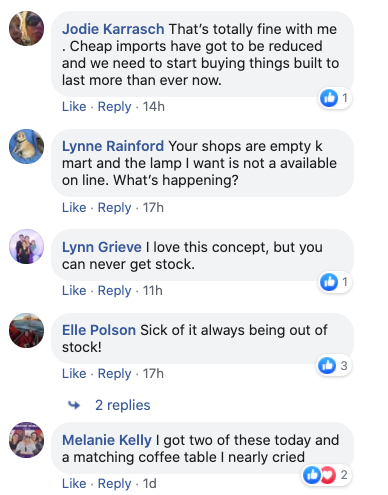
Kmart’s empty shelf saga
After shoppers took to social media in droves to decry the lack of stock in their local stores in early June, Kmart addressed the ‘unusually high demand’ in a post on Facebook, adding that things would return to normal by ‘late July’.
“We expect stock availability to improve soon and to normalise by late July. We appreciate your patience as our teams work hard to deliver the products you need, at the time you need them most,” the post read.
Just days later, John Gualtieri, the Retail Director of Kmart Australia and New Zealand, issued an apology via email saying the retailer was ‘so sorry to disappoint’ customers who are unable to find what they're looking for.
Gualtieri put the lack of stock down to the company’s decision to ‘pause inventory shipments’ following the country’s initial outbreak of coronavirus which ‘softened’ demand.
That, coupled with the fact that some of the countries — namely China — where Kmart manufactures its physical products were also put into lockdown, saw stock dry up.
Gualtieri provided a timeline for the arrival of new products across sections such as home office, furniture and accessories and kitchen and dining, with the latest date given the ‘end of July’ which has since elapsed.
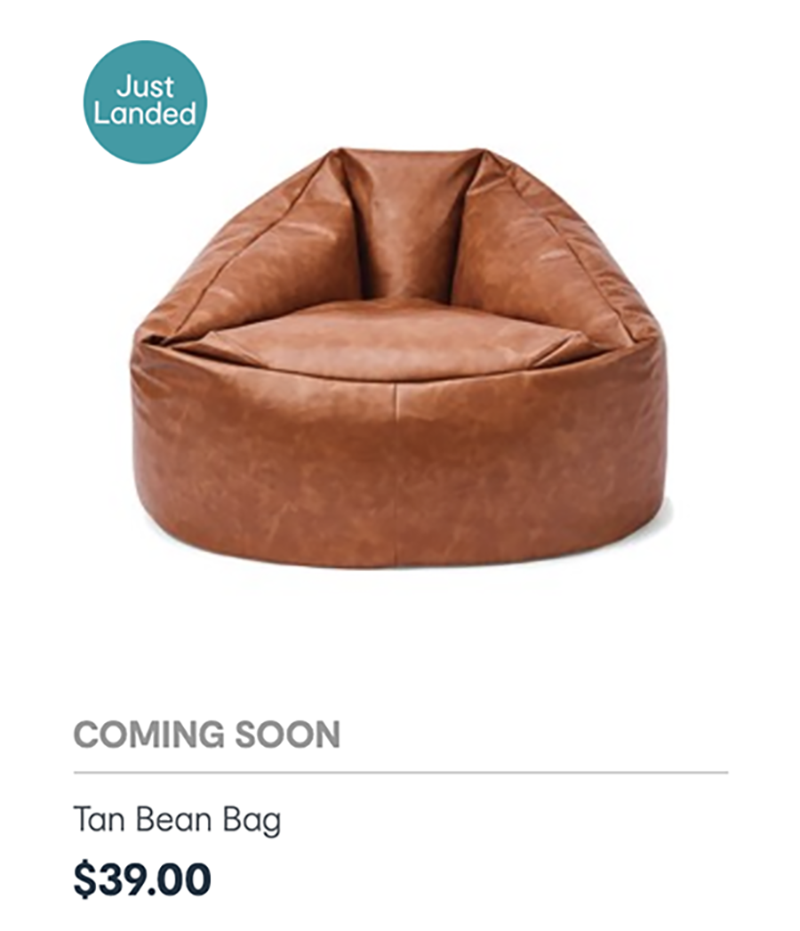
Later in June, the retailer faced backlash after new products that were labelled as ‘Just Landed’ on the website were still unavailable both online and in-store.
In some instances new products including a Tan Bean Bag and Rattan Sideboards featured both the ‘Just Landed’ and ‘Coming Soon’ stickers, causing some confusion.
By the end of June, experts were weighing in on the situation and encouraging Kmart to turn their gaze to their own backyard.
Daniel Walton, the National Secretary of the Australian Workers Union told Nine’s A Current Affair that the retailer should use the shortage as an opportunity to invest in Aussie manufacturing jobs.
As part of a commitment to supply chain transparency with consumers, Kmart provides a full list of its factory locations which include Vietnam, Thailand, Pakistan, Malaysia, Indonesia, India, Cambodia and Bangladesh — the vast majority of factories are in China.
Kmart has been contacted for comment.
Click here to sign up to our daily newsletter to get all the latest news and hacks. Or if you have a story tip, email us at lifestyle.tips@verizonmedia.com.





